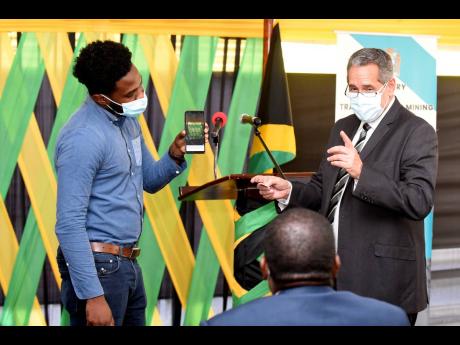Schoolers’ train on track for Jan 3 start
More than 400 students on state welfare are set to be brought to school under the ‘Back on Track’ transportation initiative just in time for the start of the new academic year, commencing January 3.
Six St Catherine schools will benefit from the programme, which is a collaboration of the Jamaica Railway Corporation (JRC), the Jamaica Urban Transit Company (JUTC), and the transport and education ministries.
Students will travel from Old Harbour and Linstead to Spanish Town by train and before connecting on any of three JUTC buses that will be deployed to the respective schools.
The schools to benefit from the train ride are Jose Marti High, Jonathan Grant High, St Catherine High, St Jago High, Innswood High, and Spanish Town High.
Donald Hanson, general manager of the JRC, reported at Tuesday’s soft launch held at the transport ministry’s Maxfield Avenue headquarters that the train has a capacity of 400 passengers with three motor coaches per line.
In each coach, 120 students will be seated, with a total of 360 students per trip in accordance with COVID-19 social-distancing requirements.
“I believe that this is the start of something great,” said Hanson, adding that he had a vision of a metro service in Kingston linking Papine, Manor Park, Half-Way Tree, and Cross Roads.
“We mapped out the route already. We just need funding,” he added.
The bill for that build-out will be US$30 million.
Most bridges from Gregory Park to Kingston are in need of repairs, said Hanson.
Approximately seven months after his initial announcement in his 2021-22 Sectoral Debate presentation in the House of Representatives, Transport Minister Robert Montague said he felt “like an expectant mother”.
Richard Troupe, acting director of safety and security in schools at the Ministry of Education, Youth and Information, commended the work done to bring the service into reality.
“We are confident that it will be a programme built on reliability and safety for our nation’s children,” he said.
Troupe added that the programme’s scope would be expanded over time to serve many more students.
Cashane Nugent, chief technology officer at Norbrook Transaction Services Limited (ePay), announced that students would be issued personalised cards in a cashless system for train fares and school canteen lunches.
Through a cell phone application, stationmasters will be able to select the route and type of payment before executing the transaction .
“There’s another benefit of going cashless: We now have a register to say this child went on the train and this child went on the bus,” said Montague.
That tracking system will boost train service accountability and offer valuable data to the education ministry on school attendance or truancy.
Montague told The Gleaner that he is not worried that the trains could be outjostled by rival taxi and bus operators.
“There’s no competition,” said Montague, noting that children would have an alternative, having been often left stranded for hours as transport operators prioritised higher-paying adults.

